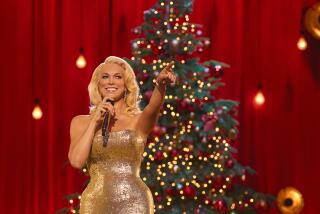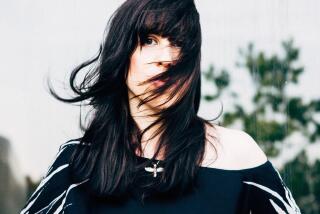STAGE REVIEW : ‘Lady Day’ Misses Sound, Style of Holiday
- Share via
Ever since her death 30 years ago, attempts have been made to re-create dramatically the mystique of Billie Holiday. Tributes and concerts, a movie and TV documentaries have been largely unsuccessful; the sole exception was a 90-minute British-made television special, which succeeded because Lady Day herself was seen at length in rare film or tape clips and was heard talking in voice-overs.
“Lady Day,” at the Odyssey Theater, ranks close to the bottom among these ventures.
In certain respects it recalls the somewhat more convincing “Lady Day at Emerson’s Bar & Grill,” a dramatization seen by this reviewer in Montreal with Ranee Lee in the title role, and later in Hollywood with S. Epatha Merkerson. Both Lee and Merkerson were reasonably successful in capturing some of the essence of Holiday’s persona; neither of them tried to imitate her once-in-a-lifetime timbre and in-person charisma.
Rena Scott, in her Lady Day impression at the Odyssey, labors under a series of handicaps. She just is not the actress for the part, which will be apparent to anyone who has seen Holiday, even on TV. She talks too fast, sometimes too flippantly, and switches moods too abruptly.
To aggravate matters, she is backed by a quartet of unyielding mediocrity, with a pianist who seems unfamiliar with some of the songs that Holiday made famous.
With a few exceptions, Scott does not come across vocally as the right artist to capture the dark, forlorn woman behind Lady Day’s glamorous mask, nor does she even bring to the brighter numbers, such as “What a Little Moonlight Can Do,” the fey quality that enabled Holiday to turn sow’s-ear songs into silk melodic purses. Visually she is too busy; part of the Holiday magic was her genius for putting a song across with a minimum of movements.
The format of the presentation, set in a diminutive space with virtually no set except for a bandstand, uses only one other character, a stage manager. The scene is London in 1954, at the end of Holiday’s first and only European tour.
This writer, who happened to be the organizer and emcee of that tour, never saw Billie Holiday almost falling-down drunk, though that is how she is depicted in the second act. This insult to her memory is only one of numerous inaccuracies and anachronisms.
The songs are interspersed with narration by Scott, some in the form of flashbacks to her traumatized childhood and adolescence. The script, though generally written with conviction, glosses over so many details that the listener may not even catch the glancing references to such episodes as her tour with the all-white Artie Shaw orchestra. The name of her first husband is mumbled just once; the later man in her life, Louis McKay, who in fact went to London with her, is written out and placed in Switzerland.
Scott’s voice is at times strong and affecting, if one tries to overlook her apparent indecision about whether to simulate the style of her role model. “Strange Fruit,” the most demanding song of all with its gruesome story of a lynching, makes a moving finale for the first act.
Nobody who has studied Holiday’s records is likely to accept the use of scat singing, in which Scott indulges two or three times, apparently unaware that Lady Day never resorted to that technique.
The absolute nadir is reached three songs from the end, when Scott sings “I Can’t Get Started” in a sort of Ethel Merman upbeat frenzy, with the pianist, Darryl Archibald, plunking out unsophisticated chord changes.
At the show Saturday evening, David Patterson played saxophone, substituting for Louis Taylor. Completing the group were Carter Armstrong on bass and Keith Swan on drums. They, like Scott, are less to blame than whoever cast them in roles for which they seem strangely unsuited.
The larger issue raised by “Lady Day” is that of what seems to be an endless attempt to take advantage of Holiday’s posthumous stature as a cult figure. The disastrously distorted story line of the 1972 movie “Lady Sings the Blues” was the egregious case in point. To Diana Ross’ credit, though, she came closer than any of her successors to the sound and persona of the woman she portrayed.
Written and directed by Stephen Stahl, “Lady Day” can be credited with good intentions on his part and on that of the ill-starred Scott. But now is the time to lay aside the tributes and dramatizations, buy all available Billie Holiday records, and let the great lady rest in peace.
At 12111 Ohio Ave., West Los Angeles, Thursdays and Fridays at 8:30 p.m., Saturdays at 10 p.m., Sundays at 7:30 p.m., indefinitely. Tickets: $13.50-$17.50; (213) 826-1626.
More to Read
The biggest entertainment stories
Get our big stories about Hollywood, film, television, music, arts, culture and more right in your inbox as soon as they publish.
You may occasionally receive promotional content from the Los Angeles Times.










